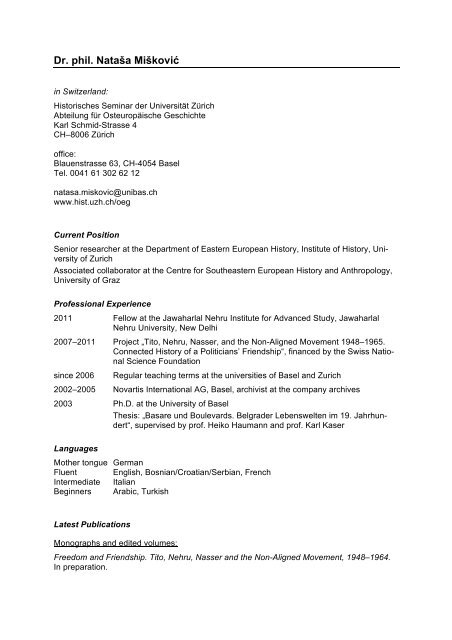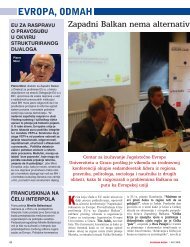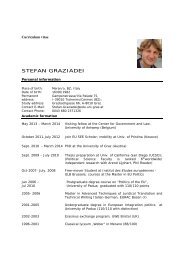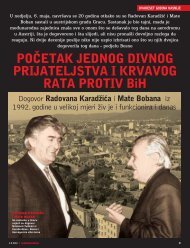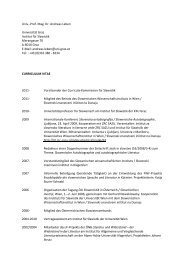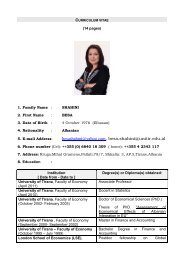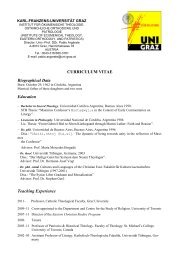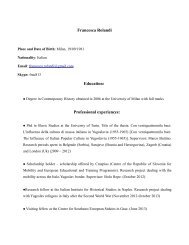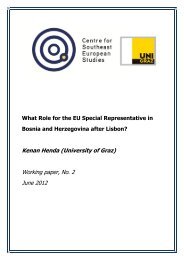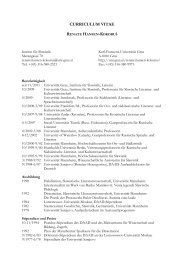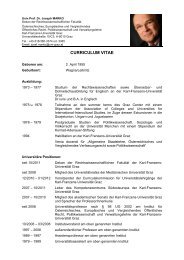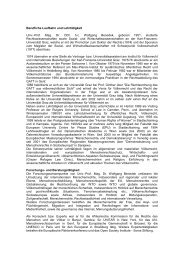CV for GrazFellowship - Centre for Southeast European Studies
CV for GrazFellowship - Centre for Southeast European Studies
CV for GrazFellowship - Centre for Southeast European Studies
Create successful ePaper yourself
Turn your PDF publications into a flip-book with our unique Google optimized e-Paper software.
Dr. phil. Nataša Miškovićin Switzerland:Historisches Seminar der Universität ZürichAbteilung für Osteuropäische GeschichteKarl Schmid-Strasse 4CH–8006 Zürichoffice:Blauenstrasse 63, CH-4054 BaselTel. 0041 61 302 62 12natasa.miskovic@unibas.chwww.hist.uzh.ch/oegCurrent PositionSenior researcher at the Department of Eastern <strong>European</strong> History, Institute of History, Universityof ZurichAssociated collaborator at the <strong>Centre</strong> <strong>for</strong> <strong>Southeast</strong>ern <strong>European</strong> History and Anthropology,University of GrazProfessional Experience2011 Fellow at the Jawaharlal Nehru Institute <strong>for</strong> Advanced Study, JawaharlalNehru University, New Delhi2007–2011 Project „Tito, Nehru, Nasser, and the Non-Aligned Movement 1948–1965.Connected History of a Politicians’ Friendship“, financed by the Swiss NationalScience Foundationsince 2006Regular teaching terms at the universities of Basel and Zurich2002–2005 Novartis International AG, Basel, archivist at the company archives2003 Ph.D. at the University of BaselThesis: „Basare und Boulevards. Belgrader Lebenswelten im 19. Jahrhundert“,supervised by prof. Heiko Haumann and prof. Karl KaserLanguagesMother tongue GermanFluent English, Bosnian/Croatian/Serbian, FrenchIntermediate ItalianBeginners Arabic, TurkishLatest PublicationsMonographs and edited volumes:Freedom and Friendship. Tito, Nehru, Nasser and the Non-Aligned Movement, 1948–1964.In preparation.
Delhi – Bandung – Belgrade: Non-Alignment between Afro-Asian Solidarity and the ColdWar. Co-edited with Harald Fischer-Tiné and Nada Boškovska. In preparation with Routledge,London (Asian <strong>Studies</strong>).Basare und Boulevards: Belgrad im 19. Jahrhundert. Wien: Böhlau 2008 (Zur Kunde SüdosteuropasII/29).Čaršije i bulevari: Svet života u Beogradu 19. veka. Translated into Serbian by Ranka Gašić,with a <strong>for</strong>eword by Ljubinka Trgovčević. Belgrade: Muzej grada Beograda, 2010 (secondedition in preparation).Articles (selection)Tito, Nehru und die ungarische Revolution 1956: Blockfreies Krisenmanagement im KaltenKrieg. Südost-Forschungen. In print.Jovanka und Josip Broz Tito: Gender and Power at the Top of Communist Yugoslavia. In:Doing Gender — Doing the Balkans. Dynamics and Persistence in South-Eastern Europe.Ed. by Roswitha Kersten-Pejanić, Christian Voß and Sabine Raljić (<strong>Studies</strong> on Languageand Culture in Central and Eastern Europe). Munich, New York 2012. In print.Wer erfand die Blockfreiheit? Überlegungen zur Verknüpfung von Osteuropäischer und Globalgeschichte.In: Osteuropäische Geschichte und Globalgeschichte, ed. by Julia Obertreisand Martin Aust. Stuttgart: Steiner (Quellen und Studien zur Geschichte des Östlichen Europas).In print.Glamour, Tracht und Pioniere. Mode im sozialistischen Jugoslawien. In: Arbeit, Konsum undFreizeit im Sozialismus. Ed. by Angelika Strobel, Nada Boškovska and Daniel Ursprung. Inpreparation.Mission, Power, and Violence: Serbia’s National Turn. In: Hannes Grandits, Nathalie Clayer,Robert Pichler, eds.: Conflicting Loyalties in the Balkans. The Great Powers, the OttomanEmpire, and Nation-building. London: I.B. Tauris, 2011, 206–224.Housing Shortage and Communal Politics in <strong>European</strong> Cities around 1900: The Cases ofBasel 1889 and Belgrade 1906. <strong>Studies</strong> in History, 26, 1, n.s. (2010), Sage Publications, 61–89.The Pre-History of the Non-Aligned Movement: India’s First Contacts to Communist Yugoslavia.1948–1950. India Quarterly 65 (2/2009), 185–200.Marriage and Household in the Belgrade Elite at the Beginning of the 20th Century: The NovakovićFamily. History of the Family 13 (2008), 152–162.Recent Lectures (selection)Yugoslavia’s Non-Aligment as a Strategy to Fend Off International Intervention. Paper to bepresented at the Annual Convention of the Association <strong>for</strong> Slavic, East <strong>European</strong> and Eurasian<strong>Studies</strong>. New Orleans, 16. November 2012.Post-Ottoman Nostalgia in the Yugoslav Capital Belgrade. Paper at the conference „BalkanWorlds: Ottoman Past and Balkan Nationalism“. University of Macedonia, Department ofBalkan, Slavic and Oriental <strong>Studies</strong>, Thessaloniki, 4 to 7 October 2012.Südosteuropäische Geschichte in der Schweiz. Gibt es das? Presentation at the Workshop„Die doppelte Marginalisierung: Der Zerfall Jugoslawiens und der Südosteuropa-Studien imdeutschsprachigen Raum“, Basler Arbeitskreis für Südosteuropa. Basel, 5. July 2012.Zwischen den Blöcken. Mode im sozialistischen Jugoslawien. Paper at the conference „Zwischenöffentlich und privat. Arbeit, Konsum und Freizeit im Sozialismus, 1960er bis Mitte
1980er Jahre“: 40 Jahre Abteilung für Osteuropäische Geschichte am Historischen Seminarder Universität Zürich, 25 to 26 November 2011.Belgrade à la fin de l’époque ottomane: Rapprochement par des sources écrites et visuellesdu XIX siècle. Lecture at the Laboratoire „Cultures et sociétés en Europe“ (UMR 7236) andthe Département d’études turques, Université de Strasbourg, 19 October 2011.Belgrade and the Summit of the Non-Aligned, September 1961. Paper presented at the conference„The Cold War and the Postcolonial Moment: Prehistory, Aims and Achievements ofthe Non-Aligned Movement, 50 Years after Belgrade“, University of Zurich and ETH Zurich,in collaboration with the Nehru Memorial Museum and Library. 3 to 4 June 2011.Jovanka Broz. Gender and Power at the Top of Communist Yugoslavia. Paper presented atthe conference „Doing Gender—Doing the Balkans. Dynamics and Persistence of GenderRelations in South-East Europe“, Humboldt Universität zu Berlin, 12 to 13 May 2011.Why Did Yugoslavia Break Up? Lecture at the Academic Staff College, Jawaharlal NehruUniversity, New Delhi, 23 March 2011.Wer erfand die Blockfreiheit? Überlegungen zur Verknüpfung von Osteuropäischer Geschichteund Globalgeschichte. Paper presented at the Annual Meeting of the Verband deutscherOsteuropahistoriker VOH „Osteuropäische Geschichte und Globalgeschichte“, Herder-Institut Marburg, 25 February 2011.Hungary 1956 in the Mirror of Nehru’s and Tito’s Letters and Speeches. Paper presented atthe conference „India and the Cold War: Historical and Contemporary Perspectives“, NehruMemorial Museum and Library, Jawaharlal Nehru Institute <strong>for</strong> Advanced Study at the JawaharlalNehru University, New Delhi, 17 to 18 December 2010.Tito, Nehru und der sowjetische Einmarsch in Ungarn 1956: Belastungsprobe einer Politikerfreundschaft.Guest lecture at the Chair <strong>for</strong> Recent History (Prof. Dr. M. Cattaruzza), Universityof Berne, 24 November 2010.Urban Elite Families in Basel and Belgrade around 1900. A Comparison. Paper presented atthe conference „The History of Families and Households. Comparative <strong>European</strong> Dimensions“,Institute of Historical Research, University of London, 24 to 26 June 2010.The Three Musketeers: Perceptions and Interpretations of Tito in India and Egypt. Paperpresented at the conference „Tito: Viđenja i tumačenja“, Institut za noviju istoriju Srbije (Beograd),Arhiv Jugoslavije (Belgrad), Südost-Institut (Regensburg). Belgrade, 7 to 9 May 2010.Consumptiveness and Demoralisation: Prof. Bücher’s Housing Investigations in Basle 1889and Belgrade 1906. Paper presented at the conference „Spacial Planning in <strong>Southeast</strong>ernEurope“, Istorijski institut SANU, Belgrade, 27/28 November 2009.Das Osmanische Reich und die nationale Wende auf dem Balkan im 19. Jahrhundert. Publiclecture at the Volkshochschule beider Basel, 6 May 2009.The Old Dictator’s Last Domain: Yugoslav Foreign Policy in the 1970s. Paper presented atthe conference „The Crisis of Modernity. China, the Soviet Union, and Yugoslavia in the1970s“, Freiburg Institute <strong>for</strong> Advanced <strong>Studies</strong>, 19 to 21 March 2009.On the Road to Non-Alignment. India’s First Contacts to Communist Yugoslavia. Guest lectureat the Nehru Memorial Museum and Library, New Delhi, 19 November 2008.Tito in den Schriften seiner Freunde und Mitarbeiter. Verschwendung und Korruption an TitosHof am Beispiel der Affäre Žeželj (Oktober 1961). Workshop „Josip Broz Tito“, Universityof Graz, 26 September 2008.Tito, Nehru, Nasser und die Blockfreienbewegung 1950–1965. Zur Beziehungsgeschichteeiner Politikerfreundschaft. Guest lecture at the Chair <strong>for</strong> contemporary history (Prof. Dirkvan Laak), University of Gießen, 18 June 2008.


